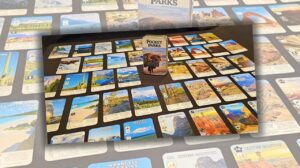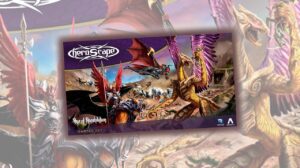Disclosure: Meeple Mountain received a free copy of this product in exchange for an honest, unbiased review. This review is not intended to be an endorsement.
Hit Me, Dealer
I’m not saying I’m a degenerate gambler, but when I go to casinos, I need a handler to tell me when to quit. Luckily, I can let loose in the form of push-your-luck board games. Whether it’s Quacks of Quedlinburg, Hot Streak, Ready Set Bet, or Flip 7, I’m all for in-game gambling that doesn’t require physically taking out a line of credit (don’t worry, folks, I’m not at that level!!).
Satchel Quest fits nicely into that mix. Designed by Molly Johnson, Robert Melvin, and Shawn Stankewich and published by Weird City Games, it comes from a team that’s no stranger to fun, accessible designs. If their names don’t ring a bell, their games surely will—Point Salad, Point Galaxy, Verdant, and TEN, to name a few.
According to the design diary, Satchel Quest began as an experiment to fuse bag-building with dungeon crawling. Early prototypes focused on making every chip draw meaningful, leading to the creation of double-sided tokens and modular dungeon paths for replayability. Through testing, the team refined ways to balance luck and strategy—adding upgrades and chip manipulation to give players more control. The result is a tactical adventure born from countless iterations, where choice and adaptability define every turn.
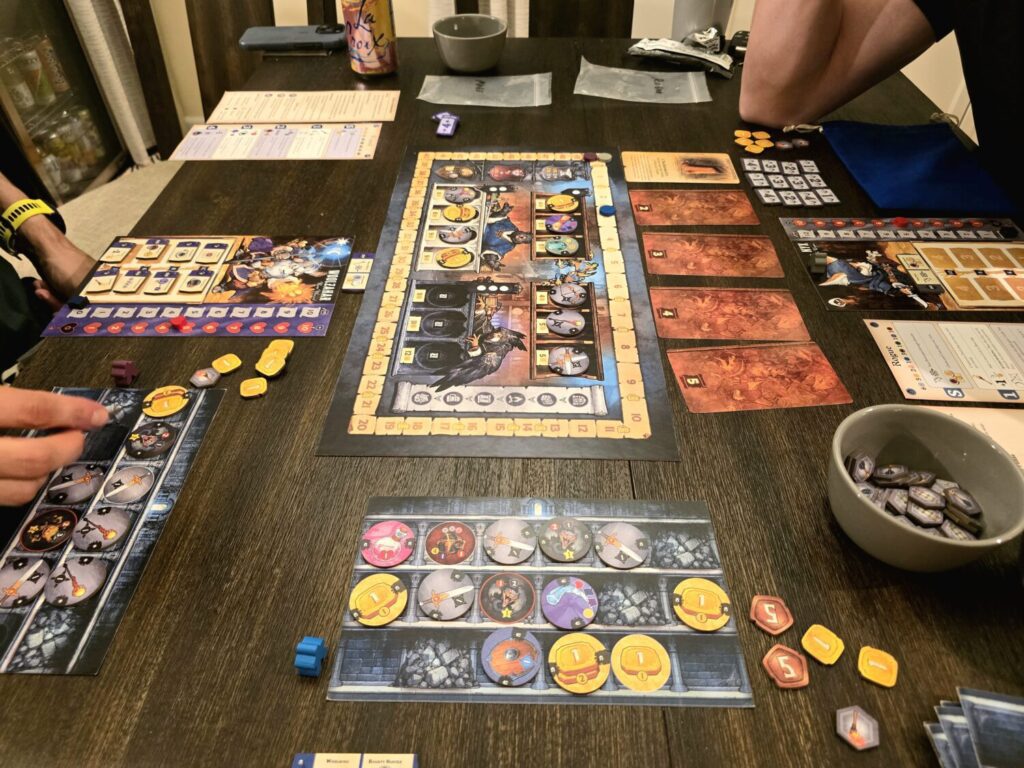
Chippy Adventuring
Over the course of five rounds, players start at the dungeon entrance and pull double-sided chips to complete each floor—strategically placing them to overcome monsters, gain treasure, open chests, and group artifacts.
Each chip features one of these traits, and players must decide where on the floor to place them. Adjacency triggers effects such as defeating monsters, opening chests, or earning riches. Because the chips are double-sided, players have flexibility in optimizing their placement.
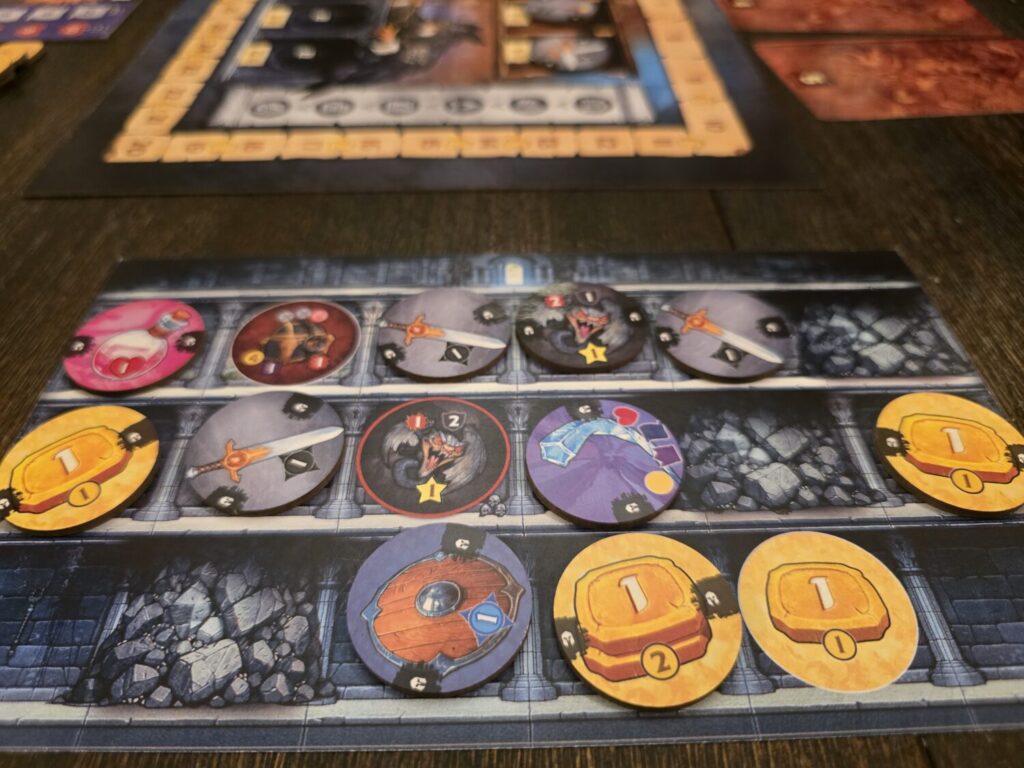
Once a floor is complete, delvers can continue deeper into the dungeon until their individual draw bag is empty or they decide to stop.
During resolution, players take damage and gain XP, money, and points before moving to the camp and village phase. Here, XP can be spent to level up and gain new skills that add mitigation, discounts, or other beneficial traits.
Finally, players can buy new chips from the village over three “buy” turns. Each turn, a player can peek at the back of any chip before deciding whether it’s worth buying—sometimes with skill-based discounts that make decisions even more interesting.
Path cards (round markers) also add rules or twists that change the round, and after the final one, the highest score is crowned the top dungeon crawler.
Quiet, Quackish Questing
Satchel Quest is a solid time. The game wears its inspiration proudly—this is Quacks of Quedlinburg’s adventurous cousin who decided to raid a dungeon instead of a cauldron. Even the catch-up mechanism is straight out of Quacks’ playbook: the number of mugs between score markers gives lagging players extra healing or money. It’s a familiar system, but it fits perfectly here.
Unlike Quacks, though, Satchel Quest builds in plenty of mitigation from the start. The ability to flip chips and place them freely gives players more opportunities to efficiently solve the puzzle at hand. Maps feature pre-printed obstacles and encounters that can help or hinder your run, and tools provide one-time powers to smooth things out.
You may be thinking, “With so much mitigation, where’s the sweat?” Don’t worry, the sweat is still there, my friends.

Monsters attack first, even if you’ve got weapons ready to take them down. Armor and healing are scarce, so you’re constantly playing chicken with your own hit points. Defeating monsters is the big payday—XP, victory points, and cash, but man, they hit like a truck. Losing all your health doesn’t end your run, but it does cut all victory points earned that round in half, which in a tight scoring game can make or break your lead.
There’s a bit of a double-edged sword here: all dungeon runs happen simultaneously, which keeps the pace brisk but also reduces interaction. Everyone runs their own gauntlet, then regroups afterward to swap battle stories.
On my first play, we tried running turns one at a time, and honestly, it was hilarious watching someone pull one monster too many, yelling “no, no, no!” across the table, or trying to puzzle out their last desperate chip placement. It doubled the playtime, sure, but doubled the laughs too.
The unique player classes and their skills are another highlight. Each has its own skill tree and starting chips, beautifully accented by Vincent Dutrait’s art. It feels thematic to tailor your bag to your character’s strengths, though by the end, everyone maxed their skill trees with XP to spare. Maybe we were too efficient, but it made leftover XP feel a bit wasteful—especially since it only converts to points at the end (at a high trade-in ratio).
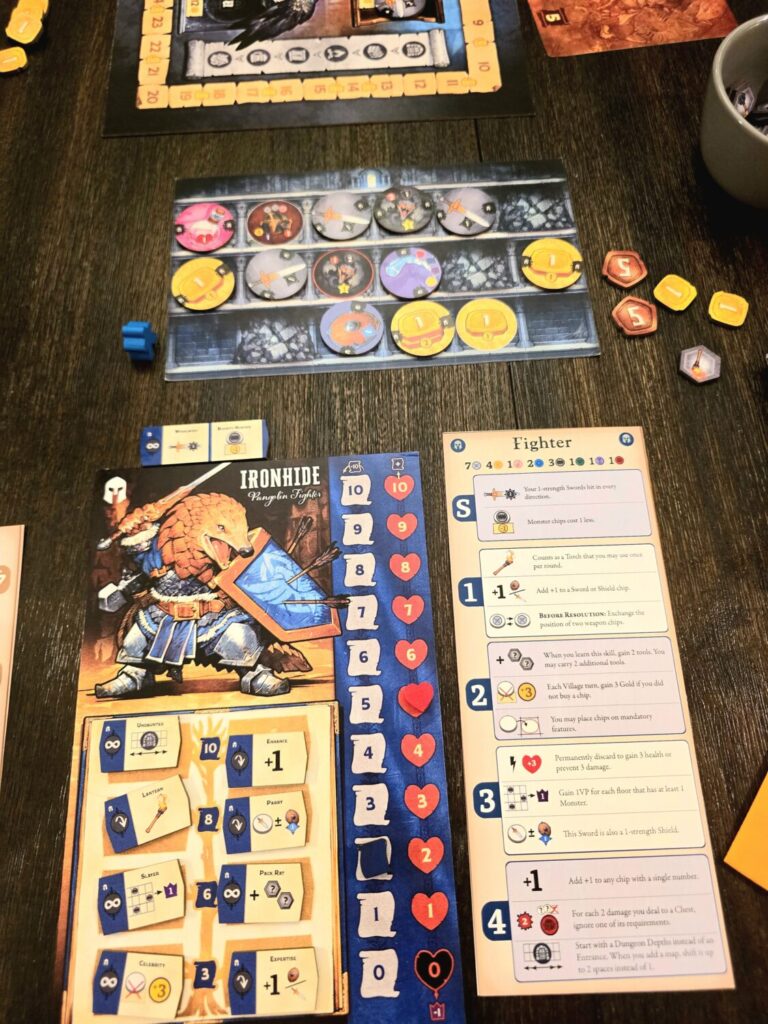
Satchel to Me
Overall, this is a great time. The rules are easy to grasp, and the gameplay flows smoothly, making Satchel Quest an approachable game for both newcomers and hobbyists. It does feel like it runs a round too long, as the challenges don’t vary much between rounds.
Gameplay doesn’t really change with player count; whether you’re delving solo or with a full crew of four, it’s still a mostly heads-down puzzle fest. The only real difference is how many people you’re racing against to snag that one juicy upgraded chip during the village phase.
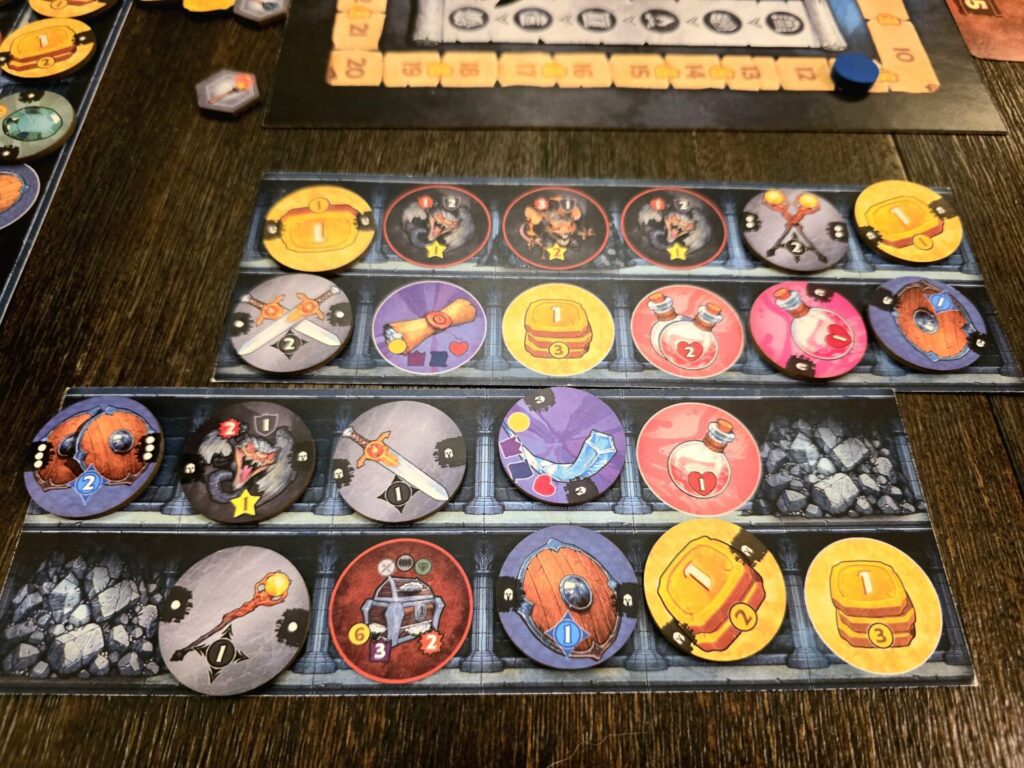
So who’s it for? If you’ve ever played Quacks and wished for more tactical control and puzzle-like placement, this is your bag.
While there’s room to add more nuance, perhaps with greater interaction or external goals, it’s still a satisfying push-your-luck experience. The dopamine hits when you pull the perfect combo, and the despair is real when you push too far and watch your hard-earned points vanish.
Satchel Quest will keep me out of the casino for now, but probably not for long. Still, this is one dungeon dive worth delving into.



